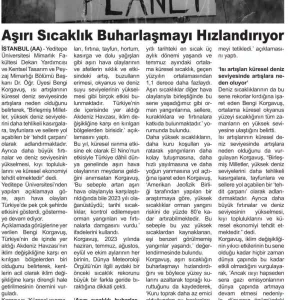Assistant Prof. Dr. Bengi Korgavuş: El Niño Increased Extreme Climate Events With Global Warming

Severe weather events have significantly impacted many cities across Türkiye and continue to do so. According to Dr. Öğr. Üyesi Bengi Korgavuş, the Mediterranean Basin, which includes Türkiye, is one of the most vulnerable regions to climate change. Dr. Korgavuş emphasized the urgent need to make cities resilient to climate change. Korgavuş continued her words as follows: "To limit global warming to 1.5 degrees Celsius, cities must undergo rapid and comprehensive transformations in energy systems, transportation, buildings, waste management, and green spaces"
Assistant Prof. Dr. Bengi Korgavuş, who is also the Vice Dean of the Faculty of Architecture at Yeditepe University and the Head of the Department of Urban Design and Landscape Architecture, made statements regarding climate change and the current state of our cities.
“The year 2023 Was Phenomenal”
Korgavuş pointed out the direct or indirect connection of most recent natural events to global climate change, stating: "The impact of climate change on our world is not only an increase in temperatures. It has many effects, such as the increase in the frequency and impact of extreme weather events and disasters such as droughts, floods, fires, floods, storms, typhoons, tornadoes, hurricanes and hailstorms, melting of glaciers, rising ocean and sea water levels. The Mediterranean Basin, including Türkiye, is one of the most vulnerable to climate change." She also noted that this year, the world, including Türkiye, has seen extreme weather events influenced by global warming and El Nino. Korgavuş elaborated, "Even compared to the increasing extreme weather events, 2023 was extraordinary; very high temperatures, uncontrollable forest fires, and storms marked it."
"Summer of 2023 Broke Temperature Records"
Korgavuş, addressing the unprecedented temperature highs of 2023, stated: "In 2023, June, July, August, September, and October left behind the previous temperature records for the individual months recorded by the World Meteorological Organization by a significant margin." Korgavuş continued her words: "July 2023 entered the records as the hottest month ever in the recorded history of the Northern Hemisphere. Temperature records were shattered in Europe, the United States, China, North Africa, and the Middle East, leading to fatal consequences for some unable to escape the heat. According to the United States National Oceanic and Atmospheric Administration, from June to August, the world experienced its hottest three-month period in recorded history, with the average global temperature in July being 1.1 degrees higher than the last century's average. When these extreme temperatures combine with other weather events, as we have experienced this year, they cause forest fires, floods, droughts, and storms."
"It Increases Fire Risk by 80 Percent"
Korgavuş underlined the connection between higher temperatures and wildfires, "Higher temperatures create drier conditions, which lead to fires igniting more easily, spreading faster, and burning more intensely. According to a study by the American Geophysical Union, high temperatures can increase the risk of forest fires by up to 80%. Consequently, we witnessed unprecedented fires caused by these high temperatures this summer."
"Dry Soil Makes Flooding Frequent and Destructive"
Dr. Bengi Korgavuş noted the impact of extreme heat on evaporation, stating: "Extreme heat accelerates evaporation, thereby reducing surface waters and drying out the soil. As dry soil is less absorbent, it leads to more frequent and devastating floods. Hot weather, including in our country, has led to record-breaking rainfall worldwide. The most deadly Mediterranean hurricane to date, Hurricane Daniel, in September, caused torrential rains, leading to flooding disasters affecting Libya, Greece, Bulgaria, and Türkiye, particularly causing heavy casualties in Libya. Floods ensued following consecutive droughts in the Horn of Africa for five seasons, triggering further displacements."
“Oceans as a Threat Multiplier”
Bengi Korgavuş pointed out that this year has seen record-breaking sea temperatures, noting that the average global ocean surface temperature reached its highest level ever. Korgavuş also emphasized the connection between these temperature increases and the rising global sea levels, stating, "The United Nations describes high sea levels as a 'threat multiplier,' leading to more dangerous hurricanes, typhoons, and floods. Also, larger storms and the rising sea levels threaten coastal communities and the global economy."
"It Has Never Been This Much"
Emphasizing that the destructive effects of climate change have never been so damaging worldwide as this year, Korgavuş said: "However, as heat-trapping greenhouse gas emissions continue to increase worldwide, it is predicted that the world will cross the critical threshold of 1.5 degrees in the next few years."
"Cities Play a Critical Role"
Korgavuş underlined the critical role of cities in the fight against climate change, stating, "Cities are both the primary source of climate change and the places most impacted by its destructive effects. They are among the most significant areas for implementing solutions to mitigate and prevent climate change."
Korgavuş offered the following suggestions for creating climate-resilient cities: "To limit global warming to 1.5 degrees Celsius, cities must undergo rapid and comprehensive transformations in energy systems, transportation, buildings, waste management, and green spaces. Increasing the number of green spaces, which act as carbon sinks in cities, can reduce carbon emissions and the urban heat island effect, combat air pollution, improve urban water management, and decrease the risk of floods, overflows, and erosion. Establishing green infrastructure systems is a key adaptive measure in cities. Implementing green infrastructure solutions like permeable materials, rainwater harvesting, rain gardens, green roofs, and green parking lots can address water management and meet the water needs of cities facing water scarcity due to climate change. Prioritizing pedestrian and bicycle usage in transportation, focusing on pedestrian-oriented design, and enhancing public transit systems can reduce the use of fossil fuels and transportation-related carbon emissions in cities. Moreover, utilizing renewable energy sources in all sectors, improving solid waste management, increasing recycling, applying nature-based solutions, and local climate action plans can make cities resilient against climate change."

